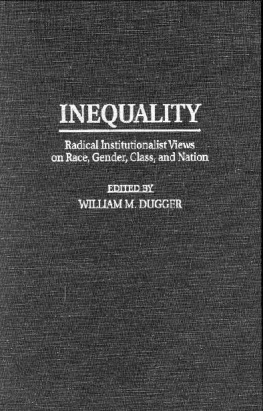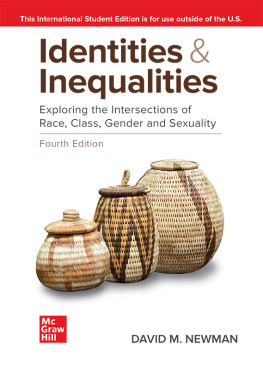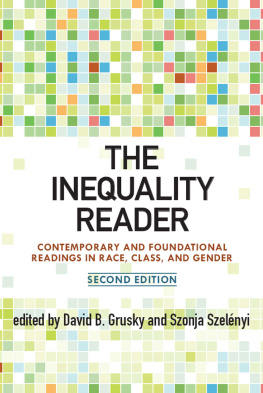INEQUALITY
Recent Titles in
Contributions in Economics and Economic History
The Development of Local Public Services, 1650-1860: Lessons from Middletown, Connecticut
Hannah J. McKinney
Rural Development Research: A Foundation for Policy
Thomas D. Rowlet, David W. Sears, Glenn L. Nelson, J. Norman Reid, and Marvin J. Yetley, editors
Epistemics of Development Economics: Toward a Methodological Critique and Unity
Kofi Kissi Dotnpere and Manur Ejaz
Economic Policy in the Carter Administration
Anthony S. Campagna
State Per-Capita Income Change Since 1950: Sharecropping's Collapse and Other Causes of Convergence
Leonard F. Wheat and William H. Crown
Work and Welfare: The Social Costs of Labor in the History of Economic Thought
Donald R. Stabile
American Trade Policy, 1923-1995
Edward S. Kaplan
Bastard Keynesianism: The Evolution of Economic Thinking and Policymaking since World War 11
Lynn Turgeon
Latin America in the World-Economy
Roberto Patricia Korzeniewicz and William C. Smith, editors
Information Technology as Business History: Issues in the History and Management of Computers
James W Cortada
Dollars Through the Doors: A Pre-1930 History of Bank Marketing in America
Richard N. Germain
The Intellectual Legacy of Thorstein Veblen: Unresolved Issues
Rick Tilman
INEQUALITY
Radical Institutionalist Views
on Race, Gender, Class, and Nation









Contents
PART ONE: BASIC APPROACHES
PART TWO: CRISIS OF THE WELFARE STATE
PART THREE: INTERNATIONAL CONTEXTS
PART FOUR: CASE STUDIES
Illustrations
FIGURE
TABLES
Introduction
William M. Dugger
Three volumes have preceded this one in a loosely related series of anthologies produced by an informal group of radical institutional economists. The first three volumes were: Radical Institutionalism, edited by William M. Dugger; The Stratified State, edited by William M. Dugger and William T. Waller, Jr.; and The Economic Status of Women Under Capitalism, edited by Janice Peterson and Doug Brown.
This new anthology focuses radical institutionalism on inequality. Radical institutionalism is a "processual paradigm focused on changing the direction of cultural evolution and the function of social provisioning in order to promote the full participation of all" (Dogger 1989, 133). Mainstream economics is not broad enough to capture the complexities of inequality, but radical institutionalism, with its blend of institutionalism, Marxism, and feminism, is. Radical institutionalists understand that at its root, inequality is social rather than individual in nature. It is a product of social processes more than of individual choices. Furthermore, inequality is not determined by alleged genetic differences between races and ethnic groups or differences between sexes or by cultural differences between classes. Most important, inequality is a social pathology, not an inevitable cost of economic progress.
This volume is in four parts. Basic ways of understanding inequality are discussed in Part I. 'fhe welfare state crisis is discussed in Part 2. Part 3 explores international contexts. Part 4 contains case studies.
Thorstein Veblen is the founder of institutional economics, so this anthology starts with fhe Egalitarian Significance of Veblen's Business-Industry Dichotomy," by Rick Tilman. Tilman explains that Veblen's appreciation for equality as an essential element in the fullness of life provides the key to understanding the "Veblenian dichotomy."
The next chapter is "Four Modes of Inequality,- by William M. Dogger. Dugger formulates a common framework and vocabulary for understanding inequality as process. Four such interrelated processes or modes are explained in terms of the practices of inequality, the myths that justify it, and the antidotes. The four modes of inequality discussed are gender, race, class, and nation.
Howard J. Sherman produces "A Holistic-Evolutionary View of Racism, Sexism, and Class Inequality." Most important in his chapter is his explanation that racist, sexist, and classist myths are far more than mere individual preferences. Such enabling myths are highly functional. They justify inequality and make it possible for the top class in society to secure its advantages and use them to reap economic rewards at the expense of the lower class.
John E. Elliott's chapter focuses even more closely on class and economic inequality. His "Exploitation and Inequality" clearly sets out the class nature of exploitation. He also relates exploitation to other modes of inequality gender and race in particular.
James Devine digs deeply into critical Marxist theory in his "Taxation without Representation: A Reconstruction of Marx's Theory of Capitalist Exploitation." He reconstructs a modern Marxist theory of exploitation, relates it to other attempts at reconstruction, and approaches exploitation as ethically objectionable in the same way that taxation without representation is objectionable.
Part I concludes with Edythe S. Miller's "Seen through a Glass Darkly: Competing Views of Equality and Inequality in Economic Thought," which contrasts the problem-solving nature of institutional economics with the Pollyanna nature of neoclassical economics.
Most industrial democracies have responded to inequality with the welfare state. However, the welfare state has come under strong attack and entered it period of crisis. This is the context for Part 2 of the anthology. Marc R. Tool's opening chapter for Part 2 is particularly significant. His "Choose Equality" uses the American instrumentalist philosophy to show why equality is an economic necessity and a social imperative. He explores meritocracy, efficiency, and equality of opportunity in terms of instrumental social value theory, laying the philosophical foundation for the welfare state as an egalitarian institution instead of a mere sop to the poor.
The second chapter in Part 2 is "Reconstructing the Welfare State in the Aftermath of the Great Capitalist Restoration," by James Ronald Stanfield and Jacqueline Bloom Stanfield. The Stanfields use institutionalist theory to identify and analyze a nurturance gap in the U.S. social economy. Closing the gap will require the financial empowerment of women and children, regardless of whether a man has conferred on them a "legitimate" relation to his patriarchy.










